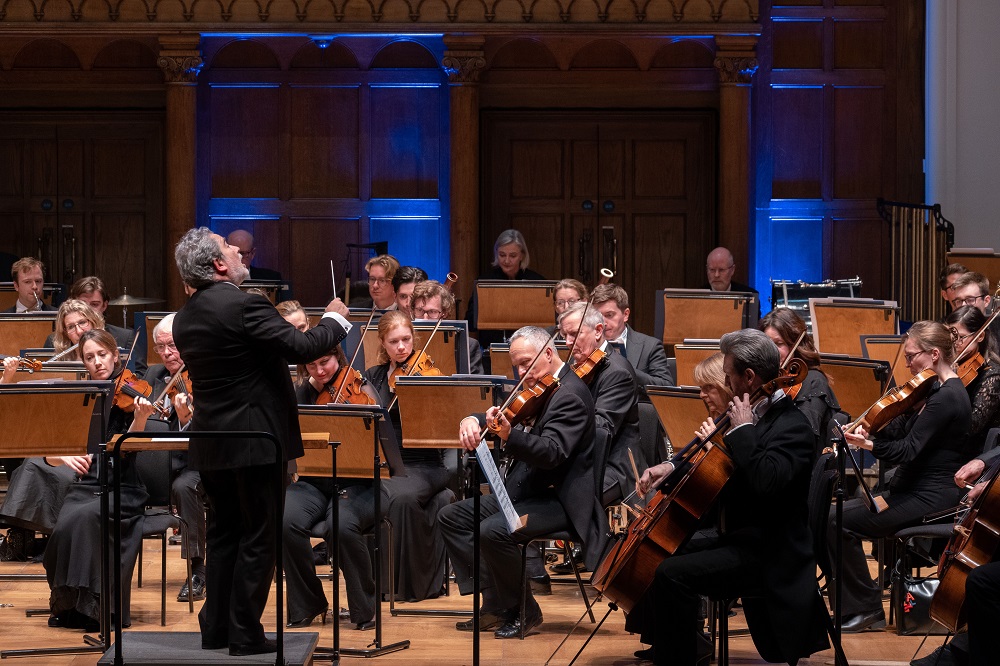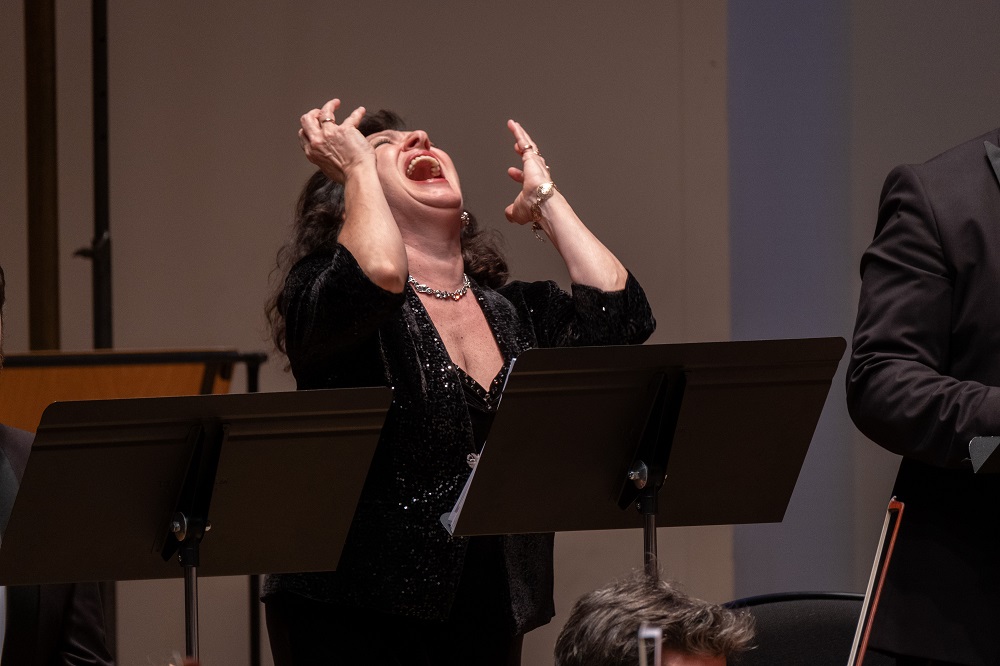Two major composers took Pushkin’s narrative poem The Gypsies as the subject for two very different operas. The 19 year old Rachmaninov in 1892 had inspiration but not much sense of dramatic continuity; Leoncavallo in 1912, 20 years on from his deserved smash hit Pagliacci, managed the flow but not the inspiration. Give me Rachmaninov’s memorability any day, but at least Leoncavallo’s hokum had the benefit of the best singers and conducting at Cadogan Hall last night.
Quality was assured before the first note of the evening. Carlo Rizzi, here conducting the Royal Philharmonic Orchestra, stands alongside Antonio Pappano as quite simply the most idiomatic interpreter of Italian opera. And what he offered up before Zingari was no opportunistic small beer. He’d spent lockdown making orchestral suites, more properly symphonic poems, from Puccini’s Tosca and Madama Butterfly. Too often Puccini as one of the great orchestrators passes people by in the opera house, but you couldn’t ignore the skill and kaleidoscopic variety here.  Rizzi’s selection, not chronological, gave us in effect four conjoined symphonic movements: an opener focusing on the horror of police chief Scarpia’s sadistic power, a slow movement leaping to a bit of the Act Three duet before showing the instrumental beauties of "Vissi d’arte", culminating in the firing-squad march only to cut straight to a scherzo made up of the Sacristan’s sprightly music and the church choir stopped dead in their frou-frouing tracks by Scarpia’s arrival. It’s always a bit disappointing to me that the opera ends with an orchestral belt-out of hero Cavaradossi’s “E lucevan le stelle”, but that was vindicated here by having the clarinet solo introducing it in the Act Three prelude as part of the finale. Throughout all this, one could marvel at Rizzi’s nimbleness, the dynamic range he drew from the RPO, the vindication of Puccini the symphonist.
Rizzi’s selection, not chronological, gave us in effect four conjoined symphonic movements: an opener focusing on the horror of police chief Scarpia’s sadistic power, a slow movement leaping to a bit of the Act Three duet before showing the instrumental beauties of "Vissi d’arte", culminating in the firing-squad march only to cut straight to a scherzo made up of the Sacristan’s sprightly music and the church choir stopped dead in their frou-frouing tracks by Scarpia’s arrival. It’s always a bit disappointing to me that the opera ends with an orchestral belt-out of hero Cavaradossi’s “E lucevan le stelle”, but that was vindicated here by having the clarinet solo introducing it in the Act Three prelude as part of the finale. Throughout all this, one could marvel at Rizzi’s nimbleness, the dynamic range he drew from the RPO, the vindication of Puccini the symphonist.
For the Leoncavallo, you had to take the Italianate ease for granted. The brushstrokes are broad as this lurid entertainment composed to follow dancing animals and acrobats at London’s Hippodrome Theatre draws on a whole armoury of cliched exotica: polonaise and mazurka rhythms (for a gypsy chorus!), Hungarian csárdás mode, the supernatural whole tone scale, the augmented seconds of the oriental scale for hoochy-koochiness, even a habanera to follow Carmen’s. Which is apt, because Prosper Mérimée, on whose novella Bizet and his collaborators based their opera, translated the original Pushkin into French.
Not that there’s a lot left of the original tale, in which urban malcontent Aleko finds freedom among rovers – and love with Zemfira, but not for long; her affairs, like Carmen’s, only last six months. To give us a not-quite-conventional soprano-tenor-baritone triangle, Leoncavallo’s plot jettisons the young gypsy with whom Zemfira takes up at a late stage in favour of Tamar, the rough diamond whom the Leoncavallo heroine (called Fleana) first rejects and then takes up when she’s tired of the outsider, Prince Radu. Leoncavallo’s chief virtue in giving us two scenes in one hour is compactness, gliding from one short set-piece to another, and the contrasts are just about sufficient to hold the interest.  Mostly it’s opera by numbers, with a slightly higher level of memorable melody in the climactic duet for Fleana and Tamar. But all of it walks the walk, and for that four top-notch singers are necessary. It’s always a pleasure to listen to the artistry of that great and poised soprano Krasimira Stoyanova (pictured above). And security was there in Lukasz Goliński’s Old Man (the smallest of the four solo roles), full-voiced tenor Arsen Soghomonyan and authentic Italianate baritone Stephen Gaertner, stepping in for an indisposed Carlos Álvarez. That this American would do the brooding, powerful job to perfection wasn’t in doubt since he was outstanding in Opera Rara’s previous Leoncavallo venture, Zaza, a more interesting work.
Mostly it’s opera by numbers, with a slightly higher level of memorable melody in the climactic duet for Fleana and Tamar. But all of it walks the walk, and for that four top-notch singers are necessary. It’s always a pleasure to listen to the artistry of that great and poised soprano Krasimira Stoyanova (pictured above). And security was there in Lukasz Goliński’s Old Man (the smallest of the four solo roles), full-voiced tenor Arsen Soghomonyan and authentic Italianate baritone Stephen Gaertner, stepping in for an indisposed Carlos Álvarez. That this American would do the brooding, powerful job to perfection wasn’t in doubt since he was outstanding in Opera Rara’s previous Leoncavallo venture, Zaza, a more interesting work.
The professional Opera Rara chorus could have done with a bit more testosterone from the men, and sometimes you got the impression from the soloists that this was a recording-studio venture (it will, of course, be released on the Opera Rara label). But it was never less than pleasurable, even if the final conflagration – no stabbing for this outcast, just arson – provoked the giggles. Bravissimi, Rizzi and company. Just one thing - the Cadogan Hall really needs to toughen up its act on mask-wearing; not to do so right now looks and feels bad.














Add comment